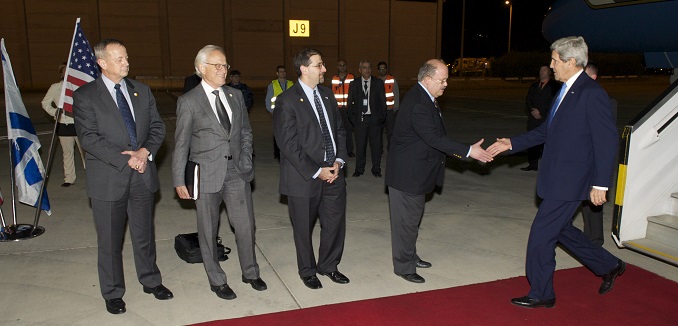The Associated Press (AP) late on Wednesday provided an overview of a security plan that Secretary of State John Kerry is expected to present to Jerusalem this week in an effort to boost U.S.-backed Israeli-Palestinian talks.
The proposal will mark the first time that Kerry, who was to arrive in Israel late Wednesday, has directly intervened in the talks since they began in late July. By all accounts, the negotiations have made no progress, despite an April target date for reaching a deal. Kerry has lots riding on the outcome of the negotiations. The sides agreed to resume talks, their first substantive dialogue in five years, under heavy American pressure, and he has repeatedly shuttled to the region and held lengthy phone conversations with Israeli and Palestinian leaders in hopes of pushing them forward.
Israel’s left-leaning Ha’aretz had previously disclosed the existence of the proposal.
In the course of the discussions, the Israeli side presented Allen with its security requirements for a future final peace agreement with the Palestinians. Israel underlined the need to leave military forces along the length of the Jordan River for an extended period, as well as the need for an Israeli presence at the border crossing at the Jordan River, continued Israeli control of the air space over the West Bank, the stationing of Israeli early-warning stations at several strategic points in the West Bank and an extensive series of other security demands. According to a knowledgeable source, Allen’s plan will include provisions that individually address the security needs that Israel has presented. Allen is expected to present American ideas for solutions that combine physical security arrangements in the territory of the West Bank with American security guarantees for Israel and proposed American military aid to the Israel Defense Forces.
The Ha’aretz report however triggered speculation by experts and journalists regarding the credibility of such assurances, with AP diplomatic writer Matthew Lee tweeting that “post-Iran deal [Israeli Prime Minister Benjamin Netanyahu] can be expected to be skeptical.” Obama administration officials have recently faced criticism for seemingly reversing themselves on a range of assurances provided over the years to allies and lawmakers. The White House has specifically been blasted for conceding that Iran will be allowed to continue enriching uranium in the context of a comprehensive agreement, and for misleading journalists who in early 2013 were probing whether government-to-government negotiations were taking place between Washington and Tehran.
[Photo: U.S. Department of State / Flickr]




